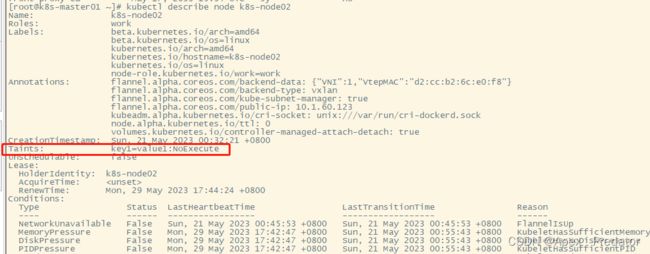k8s污点与容忍
1.前言
污点是给node节点打上污点标签,使得pod不能往该node节点上调度,污点有三种模式,分别是NoSchedule、PreferNoSchedule、NoExecute,容忍是给pod打上和node节点一样的污点标签,使pod能调度到带有该污点标签的node节点上
2.污点
NoSchedule:禁止所有pod往该node节点上调度,原本已经在节点上的pod没有影响
PreferNoSchedule:尽量不将pod调度到该节点上,但还是可以接受pod的调度,但是pod的调度一般都会优先调度到没有污点的node上
NoExecute:禁止所有pod往该node节点上调度,原本已经在节点上运行的pod也将被驱逐出去
接下来使用一下以上的三个污点模式,一个节点可以被设置多个污点
kubectl taint node 节点名称 key=value:effect
kubectl taint node k8s-node01 web=true:NoSchedule
kubectl taint node k8s-node02 app=true:PreferNoSchedule
kubectl taint node k8s-node01 web=true:NoExecute
查看节点中的污点
kubectl describe node k8s-node02
接下来说一下去除污点
删除特定的一个污点
kubectl taint node k8s-node01 web=true:NoSchedule-
也可以不指定value去删除
kubectl taint node k8s-node02 app:PreferNoSchedule-
删除关于该key的所有污点
kubectl taint node k8s-node01 web-
3.容忍
如果一个节点有多个污点,则pod必须包含该节点上的所有污点标签才可以被调度到该节点上,当然了PreferNoSchedule的污点标签是不影响的,接下来展示一下容忍的使用
新建一个yaml文件
vi deployment-nginx.yaml
apiVersion: apps/v1
kind: Deployment
metadata:
labels:
app: nginx
name: nginx
namespace: default
spec:
replicas: 3
progressDeadlineSeconds: 600
minReadySeconds: 10
strategy:
rollingUpdate:
maxSurge: 1
maxUnavailable: 0
type: RollingUpdate
selector:
matchLabels:
app: nginx
template:
metadata:
labels:
app: nginx
spec:
containers:
- name: nginx
image: nginx:1.21
imagePullPolicy: IfNotPresent
ports:
- containerPort: 80
resources:
requests:
memory: 50Mi
cpu: 0.5
limits:
memory: 100Mi
cpu: 1
这个yaml文件中没有设置容忍,接下来给node节点打上污点
kubectl taint node k8s-node01 web=true:NoSchedule
kubectl taint node k8s-node02 key1=value1:NoExecute
给两个node节点都打上了不可调度的污点,现在来执行一下yaml文件看一下效果
kubectl apply -f deployment-nginx.yaml
查看一下pod的状态
kubectl get pod -o wide -n default -l app=nginx
可以看到所有三个pod都是pending状态,node列也显示是none,说明没有适合的node给pod调度
现在更改一下yaml文件,给pod加上k8s-node01的容忍策略
vi deployment-nginx.yaml
apiVersion: apps/v1
kind: Deployment
metadata:
labels:
app: nginx
name: nginx
namespace: default
spec:
replicas: 3
progressDeadlineSeconds: 600
minReadySeconds: 10
strategy:
rollingUpdate:
maxSurge: 1
maxUnavailable: 0
type: RollingUpdate
selector:
matchLabels:
app: nginx
template:
metadata:
labels:
app: nginx
spec:
containers:
- name: nginx
image: nginx:1.21
imagePullPolicy: IfNotPresent
ports:
- containerPort: 80
resources:
requests:
memory: 50Mi
cpu: 0.5
limits:
memory: 100Mi
cpu: 1
tolerations: #配置容忍策略
- key: web #k8s-node01中配置的污点key
operator: Equal #Equal为等于,即key=value,使用Equal为精确匹配,只有当节点上 key 的值等于 value 时,才可以容忍这个 Taint,还可以使用Exists模糊匹配,使用Exists不用配置value值,只要节点上存在对应的 key,就可以容忍这个 Taint
value: "true" #k8s-node01中配置的污点value
effect: NoSchedule #k8s-node01中配置的污点effect重新加载一下 yaml文件配置
kubectl apply -f deployment-nginx.yaml
查看一下pod的状态
kubectl get pod -o wide -n default -l app=nginx
可以看到增加了k8s-node01污点的容忍策略后,pod都调度到了k8s-node01节点上
容忍策略以上四个常用的配置项外,还有一个配置项tolerationSeconds,此配置项在污点模式为NoExecute时使用,tolerationSeconds 的作用是为了在节点的 Taint 被移除之前,给予一定的时间让 Pod 在该节点上运行。这对于一些需要在节点上运行一段时间的任务非常有用,例如数据迁移、数据备份等


